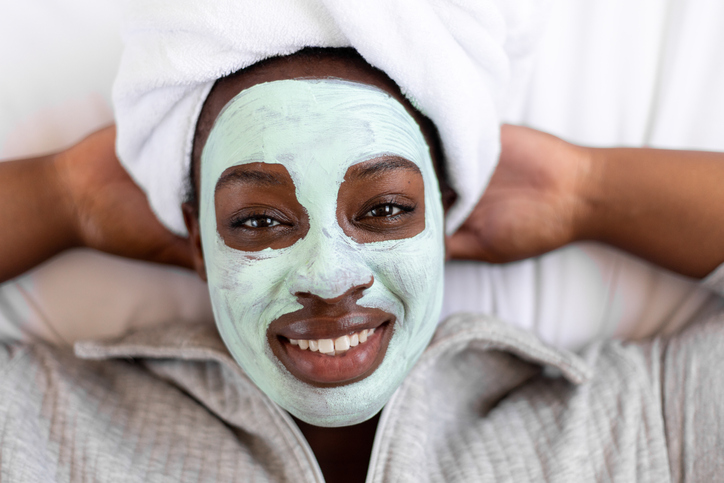Help Your Skin Recuperate From a Year of Video Calls, Stress and Neglect

By Joy Stephenson-Laws, J.D., Founder
No, it’s not our imagination. The unfortunate reality is that the pandemic has also taken a toll on our skin, making many of us seem to age faster than we otherwise would have.
While the pandemic has been with us for 18 months, we may easily look 24 or even 36 months older than we did when it started. While disconcerting, this apparent rapid aging is understandable given the challenges we all have faced to one degree or another. Video calls, staying home and doing home office, juggling family and work, being more sedentary than usual and opting for more convenient but less nutritious foods all conspired against having healthy, supple skin.
And it’s not just about vanity since anything that compromises our skin – our body’s largest organ weighing in at some eight pounds and covering over 20 square feet in an average adult – also impacts its ability to do its job. Simply put, skin is our front line of defense against the world. It protects us from the elements, helps prevent infection, makes vitamin D from sunlight and allows us to interact with and interpret our surroundings.
Given that our face and hands are arguably the most visible parts of our bodies – and the least covered and shielded from the outside world – it makes sense that this is where we would first notice the pandemic’s effects. These cover a wide range of maladies, from wrinkles to eczema and from acne (including the now infamous “maskne”) to hair loss. And the lack of sleep that many people have experienced during the pandemic can result in dark circles under the eyes along with swollen eyelids.

Perhaps the number one, or at least the most common, culprit for our skin taking a beating is the stress brought on by the pandemic. In addition to affecting sleep patterns, it also causes our bodies to manufacture the “stress hormone” cortisol, which reduces the amount of collagen our bodies make. This is important for skin health since collagen, which is the most abundant protein in our bodies, is a key part of connective tissue and can be found in our muscles, blood vessels and bones. It also is a major component of skin, where it helps give structure and prevent wrinkles and fine lines. Cortisol also can increase skin inflammation. Another effect of stress is an accelerated drying of the skin, which exacerbates wrinkles.
We all know that being sedentary, which has been a significant side effect of the pandemic as many of us stayed home all day, can contribute to weight gain, impact our mood, increase our risk for cardiovascular disease and affect our sleep. But what you may know is that lack of exercise can also impact the health and appearance of our skin. It turns out that physical activity helps blood flow to the skin and this oxygen and nutrient-rich blood helps promote the production of collagen as well as new skin cells.
Many of us have also become lax with our regular skincare routines to help keep our skin nourished and hydrated as well as protect it from the sun. Some people are still using pre-pandemic practices (which may not be the most appropriate if you are home all day), are taking care of their skin sporadically or have stopped any special steps to keeping their skin healthy. The result may be drier skin, oilier skin, more breakouts and blackheads and increased environmental damage.
Another key contributor to our skin not being as healthy as it may have been before the pandemic are dietary “shortcuts” that many people have taken over the past year or so. I totally understand that when you are juggling homeschooling with home office with parenting, one of the first things to cut corners on to save some precious time is cooking nutritious meals. And if you live alone, it can get even easier to tell yourself that “one fast food meal” or “a pizza now and then” won’t hurt. While an occasional “cheat” is fine, for many people the exception became the norm during the pandemic and processed convenience foods became standard fare.
In addition to all the other health risks of this type of diet, it also can wreak havoc on our skin. One result of eating too much sugar is damage to collagen through what is known as “glycation.” This happens when sugar molecules attach themselves to proteins and fats, which can make collagen stiffer and less elastic. This, in turn, can increase skin wrinkling.
To start to undo the damage that the pandemic has done to our skin as well as help keep it healthy moving forward, we need to address what did the harm in the first place:
Stress
While stress is an unavoidable part of life, there is a lot we can do to reduce it as well as better manage it. One of the first things is to not add unnecessary stress to our lives. As a result of the pandemic, many people became experts at “doomscrolling,” which is looking for all the news and information they could about the progress of the pandemic and usually with a disproportionate amount of attention paid to the “bad news.” While it is important to be educated and informed to help us make the best decisions about our health and that of our family, too much information can end up hurting more than it helps. So, my advice here is to limit news to specific times of the day and for limited periods of time.
It also is important to do things that can help reduce the stress we are already feeling. I relieve stress by gardening and hiking with my dogs (studies show having a pet is great for managing stress). Maybe for you it’s yoga, taking a spin class, playing basketball with your kid or even bird watching.
Another stress buster to consider is breathing exercises. Deep breathing has been shown to have a calming effect, and it’s very easy to do. One exercise I recently learned about is called “cardiac coherence,” which is where you take in a breath over the course of six seconds and then take another six seconds to exhale.
One thing to do, although it can be challenging when you are stressed, is resist the temptation many of us have when we are stressed to eat simple carbs, sugar and processed food. While it may give some temporary pleasure and relief, these are fleeting and after a bit the stress usually returns, often worse than it was before.
Sedentary Lifestyle
Moving after spending a year working from home and binge watching our favorite shows will do wonders for our skin by reducing stress, increasing blood flow and counteracting the effects of too much junk food (often eaten during the binge watching). When it comes to our skin’s health, there are studies that suggest that the greatest benefit comes from exercises that really get our blood pumping and especially in major muscle groups. These include running, walking and riding a bicycle, among others.
What is important to keep in mind, however, is that anything that gets us moving is better than sitting all day. Simple things we can do are taking the stairs, parking at the far end of the parking lot, getting up from our desks or the couch every half hour for a walk around the house (but not to the kitchen), calisthenics and stretching. In my case, during the pandemic I discovered jumping rope was something that I really enjoyed!
Diet and Nutrition
While having a skincare regimen that includes moisturizers and non-irritating cleansers is undeniably good for your skin, the best thing for it is a healthy diet (in fact, it’s not only good for our skin, but also critical to our overall health). Diet can also help reduce stress as well as support our efforts to have a more active, and less sedentary, lifestyle.
A diet like an anti-inflammatory, plant-based diet that is rich in fresh fruits and vegetables can be helpful. Also avoid too much processed foods and added sugars. This will help ensure your skin is getting the crucial nutrients it needs to be its healthiest. These include:
- Vitamin A: Important for maintaining healthy skin as well as minimizing sun damage.
- Vitamin C: Helps reduce skin dryness, supports collagen and protects from sun damage.
- Vitamin D: Reduces skin inflammation.
- Vitamin E: Helps prevent swelling of the skin and protects from sun damage.
- Silica: Required for collagen formation and supports skin elasticity and healing.
- Selenium: May play a role in preventing psoriasis.
- Zinc: May help reduce and treat acne.
It’s also important to stay hydrated and to get enough sleep. You may also want to consider what is known as cold therapy, one form of which is known as T-Shock. It is a non-invasive form of treatment which utilizes hot and cold temperatures to stimulate collagen production.
Enjoy your healthy life!
Disclaimer: This article is not intended to provide medical advice. Please consult with your doctor or another competent healthcare practitioner to get specific medical advice for your situation.
The pH professional health care team includes recognized experts from a variety of health care and related disciplines, including physicians, attorneys, nutritionists, nurses and certified fitness instructors. This team also includes the members of the pH Medical Advisory Board, which constantly monitors all pH programs, products and services. To learn more about the pH Medical Advisory Board, click here.







